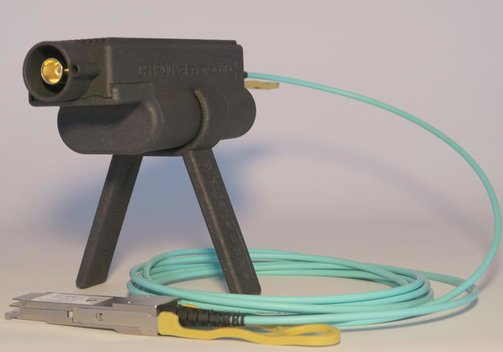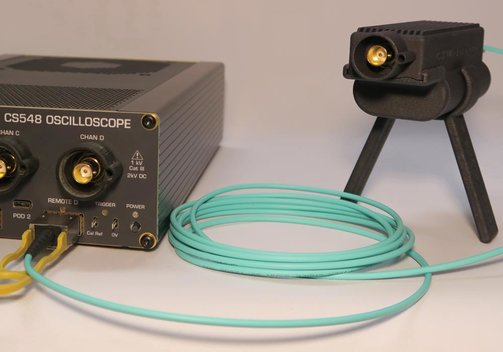Cleverscope CS1200 and CS1300 Pods
Cleverscope CS1200 and CS1300 Pods
The CS1300 pods are used to extend the capability of the CS548 oscilloscope. Two pod connectors are provided on the CS548. Pods use LVDS communications capable of 400 Mbps for good noise immunity, low EMI, and reliability.
Model Overview
| Model | Description |
| CS1200 | Battery powered, fibre linked remote digitizer head for CS548 |
| CS1300 | Direct (non isolated) digital input pod |
| CS1301 | Isolated digital input pods |
| CS1302 | Isolated 1 In/4 Out digital I/O Pod |
| CS1303 | Isolated current measurement |
| CS1304 | Isolated voltage measurement |
| CS1305 | Log pod |
| CS1306 | Can controller |
| Software support includes Pulse Builder for Pulse Trains, PWM, and double pulse generation. | |
Cleverscope CS1200 IsoPod
- 30 kV isolation provided >150 mm spacing between IsoPod and other structures.
- 2 pF free space capacitance >50 mm above reference plane.
- 100 dB CMRR at 50 MHz.
- 14 bit resolution, 100 dB dynamic range.
- 200 MHz analog bandwidth.
- 100 µV resolution on 0.8 V range.
- 200 µVRMS noise on 0.8 V range.
CS1301 Isolated Digital Inputs
The pod supports 4 isolated digital inputs with one common, and fixed voltage threshold of Vhi>2.3 V, with +18, -15 V overload protection. Isolation is 600 VRMS Cat III (UL), or 800 VDC (VDE), based on an ISOW7844FDWE, and PCB creepage. Common mode rejection is 100 V/ns.
CS1302 Isolated Digital Outputs
The pod has 1 input, and 4 outputs, one of which may be assigned as a high speed clock. The pod allows high speed generation of arbitrary signals, optionally synched to the clock, with simultaneously recording of the input signal. It may also be used as a fast isolated SPI or UART port. The application supports arbitrary pulse generation, PWM, and double pulse testing using the CS1032. The output level is 5 V (VSEL open), or 3 V3 (VSEL pulled low). Isolation is 600 VRMS Cat III (UL), or 800 VDC (VDE), based on an ISO7840DW and ISOW7744DFMR, and PCB creepage. Common mode rejection is 100 V/ns.
These pods are being developed:
- CS1300: Direct connect digital inputs. The pod supports 4 digital inputs (not isolated), with variable threshold voltage.
- CS1303: Isolated current measurement. This pod will use 4x TI AMC3306M05 with ±50 mV input range, to provide 4 individually isolated channels for current sense (50 mV current sense resistor such as Murata 3020 DMS shunts). The CS1303 can measure three phase currents and a bus current.
- CS1304: Isolated voltage measurement. This pod will use 4x TI AMC3336 with ±1 V input range to provide 4 individually isolated channels, for voltage sense. A voltage divider plugin will be provided to cover up to 2 kV. The CS1304 can measure three phase voltages, and one bus voltage. The application will be upgraded to include a power analysis function to measure power, harmonic structure, power factor, and efficiency.
- CS1305: Log pod. For logging of slow signals on the signal information logging screen. Uses an AD7124-8 8ch 24 bit SPI ADC. Can be used to log 4 channels of temperature (using an RTD) and 4 channels of voltage measurement, or 4 channels of thermocouple with RTD based cold junction temperature compensation. So this pod can be used to measure such things as a device with ambient, internal and 2 hot spot temperatures and PSU voltages and current. Or a battery charge/discharge cycle monitoring voltage, current and temperature. If using thermocouples very high temperature measurement is possible. The logging system runs separate from the capture system so that logs can run continuously, independent of trigger.
- CS1306: CAN controller. The CAN controller will use an SPI CAN controller to monitor or stimulate CAN messages in an automotive CAN network.
Information on product safety:
Manufacturer:
Cleverscope Ltd, Level 2, 101 Mt Eden Road, Mt Eden, Auckland 1025/NZL
www.cleverscope.com
Responsible person:
Meilhaus Electronic GmbH, Am Sonnenlicht 2, 82239 Alling/DEU
info@meilhaus.com
Related Products































